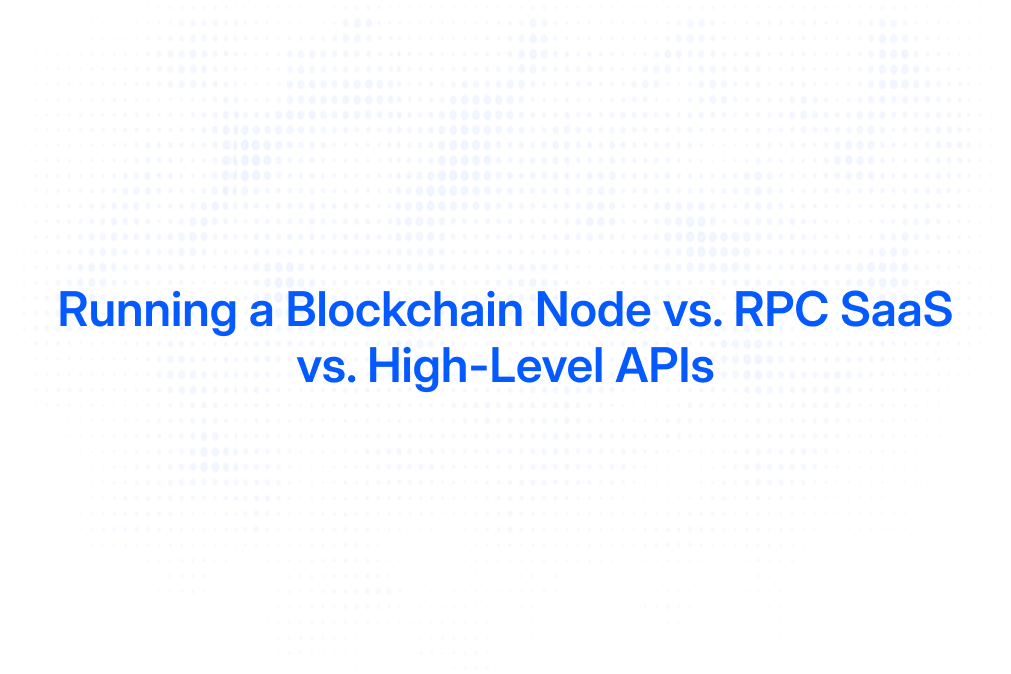MCP for Blockchain Startups: Scaling Without Downtime
In the rapidly evolving blockchain ecosystem, startups face unique challenges when it comes to scaling their infrastructure while maintaining high availability and minimizing downtime. Multi-Cloud Proxy (MCP) technology has emerged as a game-changer for blockchain startups, enabling them to build resilient, scalable, and cost-effective RPC (Remote Procedure Call) routing solutions. This article explores how MCP empowers blockchain startups to scale seamlessly without compromising on reliability.
Understanding MCP and Its Role in Blockchain Infrastructure
Multi-Cloud Proxy (MCP) is an advanced infrastructure layer that orchestrates RPC requests across multiple cloud providers and RPC endpoints. Unlike traditional single-provider RPC setups, MCP enables blockchain applications to leverage multiple RPC providers simultaneously, routing requests intelligently based on latency, availability, and cost.
For blockchain startups, MCP represents a strategic advantage. It abstracts the complexity of managing multiple RPC connections and provides a unified API endpoint that automatically balances load and handles failover scenarios. This means that if one RPC provider experiences downtime, the MCP seamlessly reroutes traffic to healthy endpoints, ensuring uninterrupted service.
Moreover, MCP supports multi-cloud deployments, allowing startups to avoid vendor lock-in and optimize for geographic latency by routing requests to the closest or fastest data center. This multi-region capability is critical for blockchain applications that require low latency and high throughput to meet user expectations.
Why MCP Matters for Blockchain Startups
Startups often operate with limited resources and cannot afford the costly downtime or performance bottlenecks that come with relying on a single RPC provider. MCP mitigates these risks by offering:
- Reliability: Automatic failover reduces the risk of RPC outages that can disrupt transactions or degrade user experience.
- Scalability: Load balancing across multiple providers supports scaling to millions of API calls without breaking the budget.
- Cost Optimization: Dynamic routing can prioritize cheaper RPC endpoints, reducing overall infrastructure expenses.
- Flexibility: Multi-cloud support allows startups to choose providers based on performance, compliance, or pricing.
In addition to these advantages, MCP also enhances security protocols by allowing startups to implement a more robust defense strategy against potential attacks. By distributing requests across various providers, the attack surface is significantly broadened, making it more challenging for malicious actors to target a single point of failure. Furthermore, MCP can integrate with advanced security features such as rate limiting and anomaly detection, which can alert teams to unusual patterns that may indicate a security threat.
Another critical aspect of MCP is its ability to facilitate rapid development and deployment cycles. Startups can experiment with different RPC providers without the need for extensive reconfiguration or downtime. This flexibility allows teams to innovate more freely, testing new features and updates in real-time while maintaining a stable user experience. As the blockchain ecosystem continues to evolve, the ability to adapt quickly to new technologies and methodologies becomes increasingly essential for maintaining a competitive edge.
How MCP Enables Seamless Scaling Without Downtime
Scaling blockchain applications is notoriously challenging due to the decentralized nature of the network and the heavy reliance on RPC providers for blockchain data and transaction submission. MCP addresses these challenges through several key mechanisms:
1. Multi-Provider RPC Routing
At the heart of MCP is multi-provider RPC routing. Instead of funneling all requests through a single RPC endpoint, MCP distributes them intelligently across multiple providers. This redundancy means that if one provider suffers an outage or experiences high latency, the MCP automatically reroutes traffic to healthier endpoints.
This approach not only prevents downtime but also improves overall response times by dynamically selecting the fastest provider based on real-time metrics. For startups, this translates into a smoother user experience and higher transaction success rates.
2. Load Balancing and Failover
MCP combines load balancing with failover capabilities. Load balancing spreads requests evenly to avoid overwhelming any single provider, while failover ensures continuity by switching to backup providers during outages. These features are essential for maintaining uptime and avoiding costly disruptions.
Blockchain applications that rely on single-provider RPC setups risk significant downtime, which can lead to transaction failures, lost revenue, and damaged reputation. MCP’s failover mechanisms safeguard against these risks by providing seamless backup routing.
3. Multi-Region Deployment for Latency Reduction
Latency is a critical factor in blockchain applications, especially those involving real-time trading, gaming, or DeFi protocols. MCP supports multi-region RPC routing, meaning requests can be routed to geographically closer data centers or providers with lower latency.
This geographic optimization reduces response times and improves transaction throughput, which is vital for startups aiming to compete in fast-paced markets. By leveraging multiple regions, MCP also enhances redundancy, ensuring that regional outages do not affect overall service availability.
Cost Efficiency Through MCP: Optimizing RPC Infrastructure
Cost management is a top priority for blockchain startups, many of which operate on tight budgets. RPC calls can quickly become expensive, especially as applications scale. MCP helps startups optimize costs without sacrificing performance or reliability.
Dynamic Routing for Cost Savings
MCP can be configured to prioritize routing requests to more cost-effective RPC providers or endpoints during periods of high demand. This dynamic routing capability allows startups to reduce their RPC spend by up to 40%, according to recent industry analyses, while maintaining the same level of service quality.
By aggregating multiple RPC providers and intelligently distributing traffic, MCP reduces dependency on any single costly provider and leverages competitive pricing across the market. This flexibility is particularly beneficial for startups that need to scale rapidly but want to avoid exponential infrastructure costs.
Reducing Hidden Risks of Single-Provider Dependence
Relying solely on one RPC provider introduces hidden risks such as sudden price hikes, service degradation, or provider outages. MCP mitigates these risks by providing a multi-provider architecture that ensures no single point of failure exists.
This multi-provider strategy not only improves uptime but also empowers startups to negotiate better pricing and service terms by maintaining leverage across multiple providers.
Implementing MCP: Practical Considerations for Startups
While MCP offers significant benefits, successful implementation requires careful planning and technical expertise. Here are some practical considerations for blockchain startups looking to adopt MCP:
Integration and API Orchestration
Startups need to integrate multiple RPC providers into a single MCP endpoint. This involves API orchestration, where the MCP layer handles request routing, retries, and error handling transparently to the application.
Choosing an MCP solution that supports seamless integration and provides developer-friendly SDKs or APIs can accelerate adoption and reduce operational overhead.
Monitoring and Analytics
Effective MCP deployment requires continuous monitoring of RPC provider health, latency, and cost metrics. Startups should implement dashboards and alerting systems to track performance and adjust routing policies dynamically.
Advanced MCP platforms offer built-in analytics that provide insights into traffic patterns, provider reliability, and cost optimization opportunities.
Security and Compliance
Multi-cloud and multi-provider setups introduce additional security considerations. Startups must ensure that data privacy, encryption, and compliance requirements are met across all providers involved in the MCP architecture.
Choosing MCP solutions with robust security features and compliance certifications is essential to protect sensitive blockchain operations.
The Future of Blockchain Infrastructure: MCP as a Standard
As blockchain applications become more complex and user expectations rise, MCP is poised to become a standard component of blockchain infrastructure. Its ability to combine reliability, scalability, and cost efficiency addresses the core pain points faced by startups and established projects alike.
Industry trends indicate a growing shift towards multi-cloud and multi-provider architectures, with MCP playing a central role in enabling this transformation. Startups that adopt MCP early will gain a competitive edge by delivering more reliable, faster, and cost-effective blockchain services.
In conclusion, MCP offers blockchain startups a powerful tool to scale their applications without the risk of downtime or spiraling costs. By embracing multi-provider RPC routing, load balancing, failover, and multi-region deployment, startups can build resilient infrastructure that supports growth and innovation in the dynamic Web3 landscape.
Ready to take your blockchain startup to the next level? With Uniblock, you can harness the power of Web3 infrastructure orchestration and eliminate the complexities of connecting to blockchain data. Join over 2,000 developers across 100+ chains who are already enjoying maximized uptime, reduced latency, and significant cost savings. Say goodbye to vendor lock-in and scale your dApps, tooling, or analytics with confidence. Start building with Uniblock today and experience the seamless integration that supports your growth in the dynamic Web3 landscape.
.svg)


.png)



